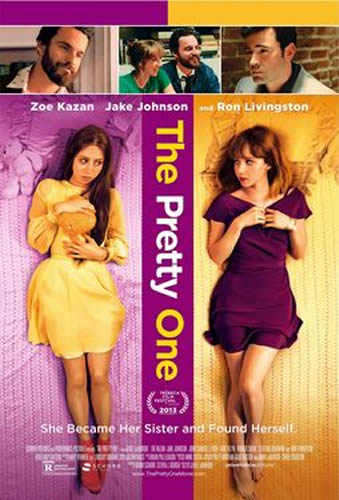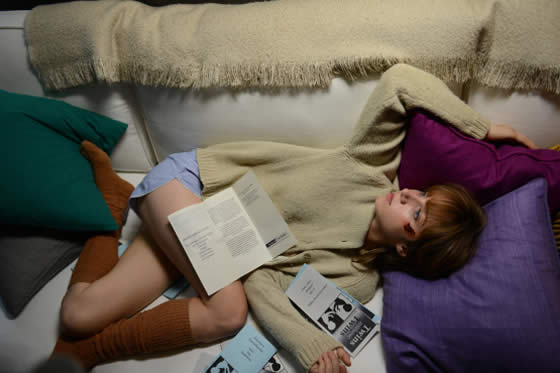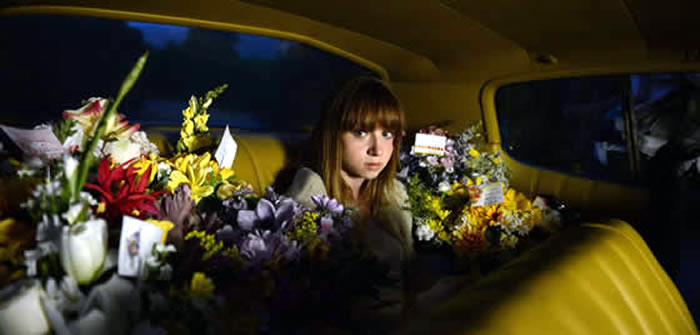 Written and directed by Jenée LaMarque, THE PRETTY ONE is a coming of age comedy about identity and a wallflower who finally learns how to break out of her shell. In a balancing act of a performance, Zoe Kazan portrays twins Laurel and Audrey, most poignantly as a relationship blooms with her new neighbor (Jake Johnson). As Laurel begins to slip into the life she has always wanted but never thought was possible, she must decide between continuing her life as Audrey and revealing herself as the perfect fraud.
Written and directed by Jenée LaMarque, THE PRETTY ONE is a coming of age comedy about identity and a wallflower who finally learns how to break out of her shell. In a balancing act of a performance, Zoe Kazan portrays twins Laurel and Audrey, most poignantly as a relationship blooms with her new neighbor (Jake Johnson). As Laurel begins to slip into the life she has always wanted but never thought was possible, she must decide between continuing her life as Audrey and revealing herself as the perfect fraud.
Jenée LaMarque, director of THE PRETTY ONE, graduated from Stanford University with a B.A. in English with a creative writing emphasis in poetry. She also has an M.F.A in Screenwriting from The American Film Institute Conservatory. At Stanford, Jenée received the Urmy/Hardy undergraduate poetry prize, studied theater, and acted in dozens of plays. At AFI, Jenée was awarded both the Hewlett Packard Fellowship, and the Fischer-Collins Fellowship (the largest scholarship given at AFI). Her screenplay, The Pretty One, was part of the 2011 Black List and her short film, “Spoonful” (her directorial debut) played at the 2012 Sundance Film Festival. The Pretty One is her first feature. Jenée is represented by Carolyn Sivitz at the United Talent Agency and lives in Los Angeles with her husband, composer/producer, Julian Wass. They have a daughter named Frankie and happily welcomed another baby in late summer 2013.
Bijan Tehrani: THE PRETTY ONE is a bit unusual for an American film; it has the feel of a British or in general European film. Would you agree?
Jenee Lamarque: Yes, it’s so funny. I think when we casted the film, I found that we had a lot of Australian actors auditioning for the film and I felt like in some ways that my sense of humor is Australian and obviously there is a connection to Britain there, but yes, it has a certain vision that is slightly more European than an American film.
BT: How did you initially come up with the idea for THE PRETTY ONE?
JL: It was sort of a combination of things in my life. My best friend passed away in my early twenties in the week that I graduated from college. When he died, I was in this place in my life where I was very unsure what would happen to me and it was a really formative experience. I had written this very bad first act of a screenplay where there was an identical twin who had lost her sister, and I remember someone telling me that if you have written something horrible then you should take the best part of that horrible thing and try to build a story around that. So, that is how I came up with the idea of creating a story about the lost twin and also a coming of age story of discovering yourself through loss. The story directly related to me and losing my best friend, so it sort of coerced me to making this project. 
BT: As someone who has worked as a film critic for years, I look for fresh ideas and films that are original and I think “The Pretty One” is one of them. It reminds me of Stanley Kubrick movies; there is this freshness and the way the characters work on screen brings great insight. Where you at all a Stanley Kubrick fan?
JL: I was a huge Kubrick fan. I mean I am a huge fan. When I was in college I wrote this very long research paper about Stanley Kubrick. I have watched all of his films and really love his work. The purpose in all of his filmmaking, how precise he was, and what a strong point of view he had was inspirational to me and it was a style of filmmaking that I really appreciated.
BT: You have worked on poetry and you can see the visual poetry in your film, how much did poetry influence your filmmaking style?
JL: In terms of writing and directing, it is different. With writing, you are creating images with words and trying to tell a story through images, so poetry and screenwriting is very close even though there is a whole other set of crafts and tools that you need as a screenwriter that are separate from your skills as a poet. That really helped me in terms of being a director because when you see those images, you can see the film before it is made and it gives you a strong feeling about how things should look. So I think the intersection of poetry and filmmaking is interesting. For me, there is a lot of use of negative space in the film, so I talked to the cinematographer a lot about framing shots after Audrey had died, so we would frame a two shot because it is a single where someone used to be. In this case, you can say poetry found its way into the visual storytelling.
BT: How did you go about casting THE PRETTY ONE?
JL: The cast came together in different ways. Zoe, for example, took a great deal of time to cast because the balance of the movie is based around her characters. When Zoe came in for one of our last casting sessions, it was clear that this was the person that needed to play these roles. I looked at my producer, Steven Berger, and we had an understanding of “Yes, we finally found her!” In terms of the other roles, they were offered to actors. I really was a fan of Jake Johnson’s work and he was someone who we knew would have good screen chemistry, and we were lucky because that was indeed the case. I worked with Zoe for about 6 months preparing for the project, and then we had a week of rehearsals with the actors where we did a lot of improvisation—not so much rehearsing scenes, but rehearsing the back story and the relationships between the characters.
BT: Audiences can see real transformation between the characters. This is a very difficult thing to portray effectively in a film. How did you go about accomplishing this?
JL: You kind of have to backtrack as a writer and figure out what you want to know and what you want to happen over a period of time. It feels like a progression of development and part of that is dealing with set-ups and payoffs. You must set up your characters for growth both with their relationships and within themselves.
BT: As someone who loved the film, I am looking forward to your next one. Are you working on any new projects right now?
JL: I am starting to work on a new project, but it is in the beginning stages. I just began brainstorming and writing, and it will feature a female protagonist who is a professional surrogate mother. I am hoping to focus on my writing because I just had a baby in August, so I have been focused on my home life. I have a six-year-old daughter and a six-month-old daughter.
BT: Wonderful! Thank you for taking the time to speak to Cinema Without Borders and our readers!
THE PRETTY ONE opening in Los Angeles and Orange County on February 21 (opened in NY on 2/7).

